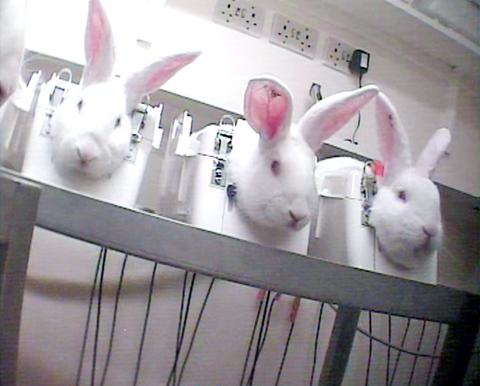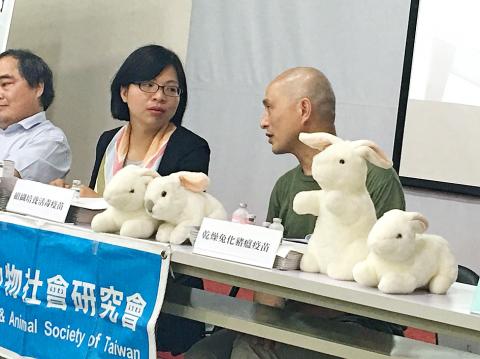An animal rights group yesterday criticized the Council of Agriculture for continuing to use rabbits to produce swine fever vaccines — killing more than 500,000 rabbits over 18 years — when alternative, humane production methods are available.
Showing videos and photographs of rabbits locked in tiny boxes and being injected with swine fever virus, the Environment and Animal Society of Taiwan said that the rabbits experience intense pain and are later killed so their organs and tissues can be harvested to make vaccines.
That is how the council has produced classical swine fever vaccines since the 1950s, and rabbits are killed with air embolism or carbon dioxide, which cause excruciating pain and suffering, society chief executive Wu Hung (朱增宏) said.

Photo courtesy of the Environment and Animal Society of Taiwan
A Taiwanese company developed an alternative swine fever vaccine production method in 1996, which requires only the cultivation of animal tissues to produce vaccines without killing animals, Wu said.
Another company unveiled another swine fever vaccine in 2011 that also does not require killing animals, he said.
“Both products can replace the councils’ vaccine and are more efficient, but the council has not ceased its vaccine production using live rabbits, causing the unnecessary death of more than 500,000 rabbits between 1998 and last year, according to data gathered from the council’s Animal Health Research Institute,” he said.

Photo: Wu Hsin-tien, Taipei Times
According to the Animal Protection Act (動物保護法), the use of live animals for research should be avoided where possible, but the council’s practice clearly contravenes the act, he said.
The council launched a program to eliminate swine fever in 1996, but the goal has not been achieved, suggesting the ineffectiveness of the council’s vaccine program, he said.
“Is animal testing a necessary evil when there are alternatives? Is the disease an excuse for the council to keep the vaccine industry afloat?” he asked, calling on the council to propose a timetable to phase out the use of live animals in swine fever vaccine production.
Bureau of Animal and Plant Health Inspection Quarantine Deputy Director Shih Tai-hua (施泰華) said there have been no reported swine fever cases since 2005, and the council is assessing the feasibility of stopping the vaccination program as soon as the end of this year.

A preclearance service to facilitate entry for people traveling to select airports in Japan would be available from Thursday next week to Feb. 25 at Taiwan Taoyuan International Airport, Taoyuan International Airport Corp (TIAC) said on Tuesday. The service was first made available to Taiwanese travelers throughout the winter vacation of 2024 and during the Lunar New Year holiday. In addition to flights to the Japanese cities of Hakodate, Asahikawa, Akita, Sendai, Niigata, Okayama, Takamatsu, Kumamoto and Kagoshima, the service would be available to travelers to Kobe and Oita. The service can be accessed by passengers of 15 flight routes operated by

GIVE AND TAKE: Blood demand continues to rise each year, while fewer young donors are available due to the nation’s falling birthrate, a doctor said Blood donors can redeem points earned from donations to obtain limited edition Formosan black bear travel mugs, the Kaohsiung Blood Center said yesterday, as it announced a goal of stocking 20,000 units of blood prior to the Lunar New Year. The last month of the lunar year is National Blood Donation Month, when local centers seek to stockpile blood for use during the Lunar New Year holiday. The blood demand in southern Taiwan — including Tainan and Kaohsiung, as well as Chiayi, Pingtung, Penghu and Taitung counties — is about 2,000 units per day, the center said. The donation campaign aims to boost

ENHANCING EFFICIENCY: The apron can accommodate 16 airplanes overnight at Taoyuan airport while work on the third runway continues, the transport minister said A new temporary overnight parking apron at Taiwan Taoyuan International Airport is to start operating on Friday next week to boost operational efficiency while the third runway is being constructed, the Ministry of Transportation and Communications said yesterday. The apron — one of the crucial projects in the construction of the third runway — can accommodate 16 aircraft overnight at the nation’s largest international airport, Minister of Transportation and Communications Chen Shih-kai (陳世凱) told reporters while inspecting the new facility yesterday morning. Aside from providing the airport operator with greater flexibility in aircraft parking during the third runway construction,

American climber Alex Honnold is to attempt a free climb of Taipei 101 today at 9am, with traffic closures around the skyscraper. To accommodate the climb attempt and filming, the Taipei Department of Transportation said traffic controls would be enforced around the Taipei 101 area. If weather conditions delay the climb, the restrictions would be pushed back to tomorrow. Traffic controls would be in place today from 7am to 11am around the Taipei 101 area, the department said. Songzhi Road would be fully closed in both directions between Songlian Road and Xinyi Road Sec 5, it said, adding that bidirectional traffic controls would